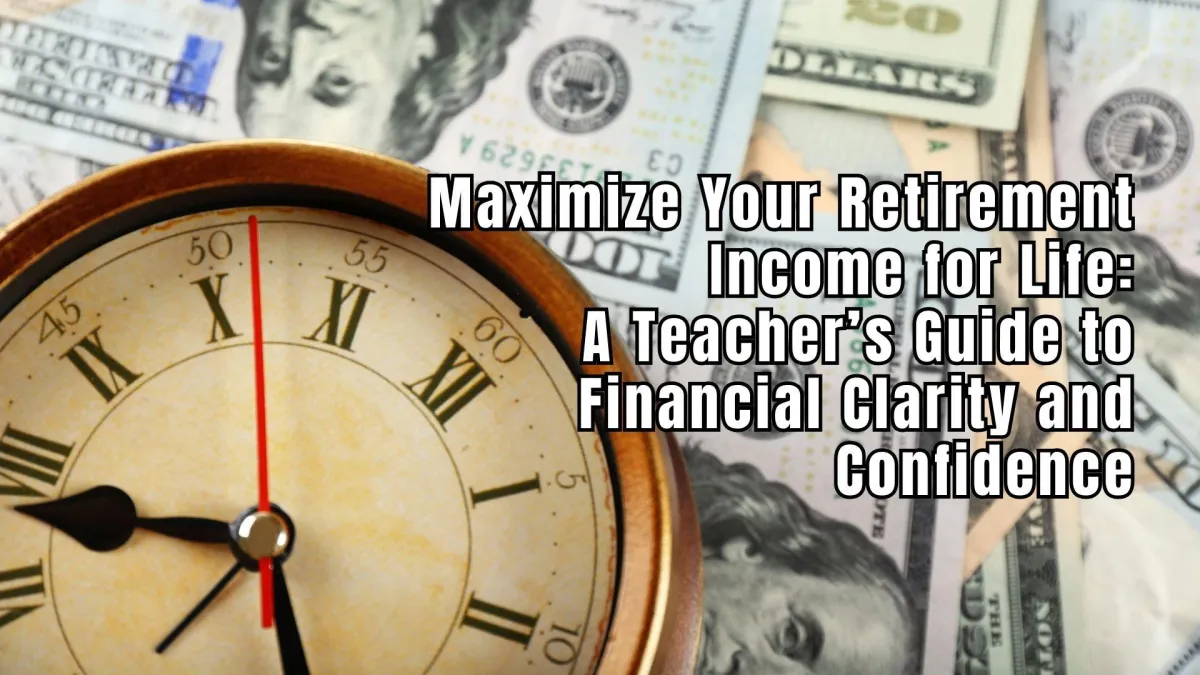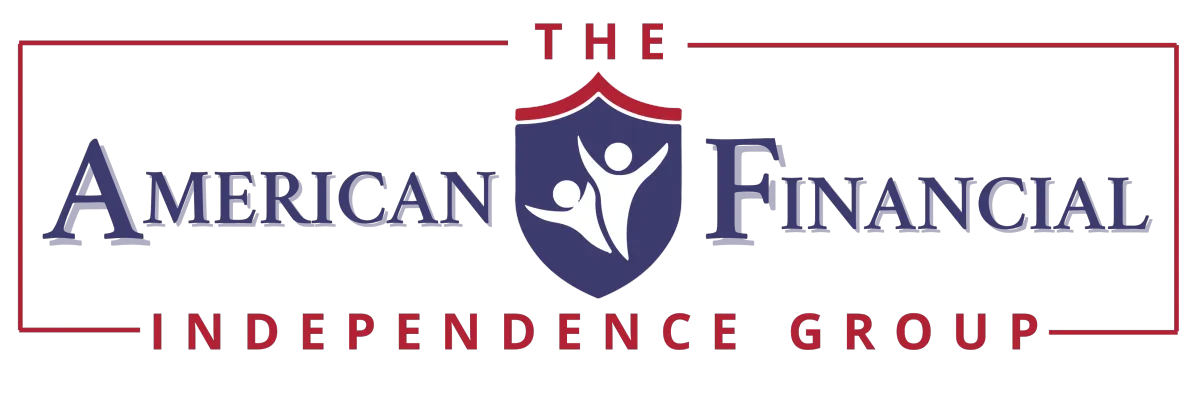BLOG, ARTICLES, & RESOURCES

Maximize Your Retirement Income for Life: A Teacher’s Guide to Financial Clarity and Confidence
After years in the classroom, guiding students, managing lesson plans, and juggling endless to-do lists, it’s finally your turn. Retirement! But here’s the million-dollar question: Will your retirement income last as long as you do?
That question alone keeps many educators awake at night. Some of you are in the public system with pensions; others are in private schools relying on 403(b)s, IRAs, or other savings. Either way, the fear of running out of money—or not being able to enjoy the retirement you’ve worked decades for—is real.
Here’s the thing: retirement isn’t just a finish line. It’s the start of a new chapter, and just like every great class you’ve taught, this chapter needs a solid lesson plan.
I’m Debbie Majher—former classroom teacher, now financial planner for educators—and I’ve seen it all. Teachers who stepped into retirement confidently, and others who wished they had “studied” a bit more before leaving the classroom. My mission? To help you design a retirement plan that works as hard as you have.
In this article, I’ll share practical, easy-to-understand strategies to maximize your retirement income for life. Whether you’re a year from retiring or still a decade away, these steps can make all the difference.
So, grab your red pen and notebook—let’s dive in!
Why Retirement Without a Plan Feels Like Teaching Without a Lesson Plan
If you’ve ever walked into class without a plan (don’t worry, your secret’s safe with me), you know the stress. Things can spiral quickly, right? Retirement without a clear income plan feels the same way.
Here are some of the biggest pitfalls I see educators facing:
Claiming Social Security too early – locking in less income for the rest of your life.
Ignoring inflation – today’s $100 won’t buy you the same groceries in 20 years.
Underestimating medical costs – Medicare doesn’t cover everything, and long-term care can drain savings fast.
Spending without strategy – dipping into savings too quickly or from the wrong accounts.
The result? Stress, uncertainty, and in some cases—having to cut back on the retirement lifestyle you worked so hard for.
But don’t worry—we’re not here to scare you. We’re here to fix it.
The Retirement Lesson Plan: 5 Key Steps to Maximize Income
Think of this as your Retirement Lesson Plan. Just like teaching, where success comes from clarity and structure, retirement income planning also benefits from having a roadmap. Let’s break it down into five key steps.
1. Write Your Retirement Income Plan
This is your syllabus for retirement. Without it, you’re just guessing.
Ask yourself:
What’s my monthly “must-have” income? (housing, food, medical)
What’s my “want-to-have” income? (travel, hobbies, spoiling grandkids)
Which accounts will I pull from first? (pension, 403(b), IRA, savings)
What’s my backup plan for unexpected expenses?
Pro Tip: Use the “Now, Soon, Later” bucket strategy.
Now Bucket: Cash or short-term savings you’ll use in the next 1–3 years.
Soon Bucket: Medium-term investments (bonds, conservative funds) for 4–10 years.
Later Bucket: Long-term growth (stocks, annuities, etc.) for 10+ years.
2. Maximize Your Social Security Benefits
Here’s where timing really matters.
Delay if you can: Waiting until age 70 can increase your benefit by 24–32% compared to claiming at 62. That’s a lifetime raise!
Coordinate with your pension: Some educators find their pension reduces Social Security benefits (the dreaded WEP or GPO). Planning can minimize the sting.
For couples: Timing your benefits strategically can help maximize survivor benefits, too.
Think of Social Security as one of your strongest “textbooks.” Use it wisely.
3. Consider a Hybrid Retirement
Who says you have to go from full-time to zero? Many educators thrive in a “hybrid” retirement—working part-time, consulting, or tutoring.
Why it works:
Keeps some income flowing.
Reduces strain on savings.
Eases the emotional transition (because let’s be honest, teachers don’t just stop teaching overnight).
Even a few hours a week can add stability and purpose to your retirement years.
4. Protect Your Savings from Inflation
Inflation is sneaky—like those classroom supply lists that somehow get longer every year.
If your income doesn’t grow, your spending power shrinks. Imagine living on the same “salary” you had 20 years ago—ouch!
Here’s how to guard against it:
Keep some money in investments that grow over time.
Consider annuities or pension options with cost-of-living adjustments.
Don’t keep everything in cash—it feels safe, but actually loses value over time.
5. Plan for Long-Term Medical Costs
This is the elephant in the room. Nobody wants to talk about it, but ignoring it doesn’t make it go away.
Medicare doesn’t cover everything. You’ll need supplemental insurance.
Long-term care (like nursing homes or in-home assistance) can drain savings fast.
A “healthcare bucket” set aside for these costs can protect the rest of your retirement plan.
Think of this as grading ahead—you’re making sure future “surprises” don’t wreck your retirement gradebook.
FAQs: Your Retirement Questions Answered
Q: What if I retire early—will my money run out? A: Not if you plan. Early retirement just means you’ll need to stretch your income longer. A written plan will help identify gaps before they become problems.
Q: Do private school teachers without pensions have different challenges? A: Yes—without a pension, your retirement income depends heavily on savings and Social Security. The principles are the same, but you’ll rely more on that bucket strategy.
Q: What’s the biggest mistake you see educators make? A: Claiming Social Security too early and underestimating medical costs. Both can shrink your income faster than you expect.
Q: Should I still invest in retirement? Isn’t it too risky? A: The key is balance. Some money should keep growing for the long haul, but your “Now” bucket should stay safe. It’s not about gambling—it’s about protecting your future self.
Bringing It All Together
Let’s recap the big ideas:
Write a Retirement Income Plan – Know where your money will come from and when.
Maximize Social Security – Timing is everything.
Consider Hybrid Retirement – Keep purpose and income flowing.
Protect Against Inflation – Growth investments matter.
Plan for Medical Costs – Don’t let healthcare wipe out your savings.
Conclusion: Your Homework Assignment
Retirement income optimization isn’t about complicated math—it’s about having a plan you can follow with confidence.
Educators, you’ve spent your life preparing others. Now it’s your turn to prepare yourself. Imagine retiring with a clear “lesson plan” that covers all the bases—income, health, lifestyle, and peace of mind. That’s the power of planning ahead.
So here’s your homework: Pick just one of these steps and take action this week. Maybe it’s looking at your Social Security statement, maybe it’s setting up a healthcare bucket, or maybe it’s mapping your “Now, Soon, Later” buckets.
Then, share your choice (or results) with me—I’d love to hear which step you’re tackling first!
Because here’s the truth: the only limit to your retirement tomorrow is the doubt you carry today. Let’s replace that doubt with clarity and confidence—so you can enjoy the retirement you’ve dreamed of.
Want to Learn more? Visit our Resource Center!
DISCLAIMER:
These statements are for information only. Please consult a financial professional for advice specific to your situation. Debora Majher offers Investment Advisor Services through Evergreen Wealth LLC dba Evergreen Retirement services, and insurance solutions as Debora Majher, Independent Agent. Neither Debora Majher nor David Majher work for the Social Security Administration or CMS.
BLOGS & RESOURCES

Maximize Your Retirement Income for Life: A Teacher’s Guide to Financial Clarity and Confidence
After years in the classroom, guiding students, managing lesson plans, and juggling endless to-do lists, it’s finally your turn. Retirement! But here’s the million-dollar question: Will your retirement income last as long as you do?
That question alone keeps many educators awake at night. Some of you are in the public system with pensions; others are in private schools relying on 403(b)s, IRAs, or other savings. Either way, the fear of running out of money—or not being able to enjoy the retirement you’ve worked decades for—is real.
Here’s the thing: retirement isn’t just a finish line. It’s the start of a new chapter, and just like every great class you’ve taught, this chapter needs a solid lesson plan.
I’m Debbie Majher—former classroom teacher, now financial planner for educators—and I’ve seen it all. Teachers who stepped into retirement confidently, and others who wished they had “studied” a bit more before leaving the classroom. My mission? To help you design a retirement plan that works as hard as you have.
In this article, I’ll share practical, easy-to-understand strategies to maximize your retirement income for life. Whether you’re a year from retiring or still a decade away, these steps can make all the difference.
So, grab your red pen and notebook—let’s dive in!
Why Retirement Without a Plan Feels Like Teaching Without a Lesson Plan
If you’ve ever walked into class without a plan (don’t worry, your secret’s safe with me), you know the stress. Things can spiral quickly, right? Retirement without a clear income plan feels the same way.
Here are some of the biggest pitfalls I see educators facing:
Claiming Social Security too early – locking in less income for the rest of your life.
Ignoring inflation – today’s $100 won’t buy you the same groceries in 20 years.
Underestimating medical costs – Medicare doesn’t cover everything, and long-term care can drain savings fast.
Spending without strategy – dipping into savings too quickly or from the wrong accounts.
The result? Stress, uncertainty, and in some cases—having to cut back on the retirement lifestyle you worked so hard for.
But don’t worry—we’re not here to scare you. We’re here to fix it.
The Retirement Lesson Plan: 5 Key Steps to Maximize Income
Think of this as your Retirement Lesson Plan. Just like teaching, where success comes from clarity and structure, retirement income planning also benefits from having a roadmap. Let’s break it down into five key steps.
1. Write Your Retirement Income Plan
This is your syllabus for retirement. Without it, you’re just guessing.
Ask yourself:
What’s my monthly “must-have” income? (housing, food, medical)
What’s my “want-to-have” income? (travel, hobbies, spoiling grandkids)
Which accounts will I pull from first? (pension, 403(b), IRA, savings)
What’s my backup plan for unexpected expenses?
Pro Tip: Use the “Now, Soon, Later” bucket strategy.
Now Bucket: Cash or short-term savings you’ll use in the next 1–3 years.
Soon Bucket: Medium-term investments (bonds, conservative funds) for 4–10 years.
Later Bucket: Long-term growth (stocks, annuities, etc.) for 10+ years.
2. Maximize Your Social Security Benefits
Here’s where timing really matters.
Delay if you can: Waiting until age 70 can increase your benefit by 24–32% compared to claiming at 62. That’s a lifetime raise!
Coordinate with your pension: Some educators find their pension reduces Social Security benefits (the dreaded WEP or GPO). Planning can minimize the sting.
For couples: Timing your benefits strategically can help maximize survivor benefits, too.
Think of Social Security as one of your strongest “textbooks.” Use it wisely.
3. Consider a Hybrid Retirement
Who says you have to go from full-time to zero? Many educators thrive in a “hybrid” retirement—working part-time, consulting, or tutoring.
Why it works:
Keeps some income flowing.
Reduces strain on savings.
Eases the emotional transition (because let’s be honest, teachers don’t just stop teaching overnight).
Even a few hours a week can add stability and purpose to your retirement years.
4. Protect Your Savings from Inflation
Inflation is sneaky—like those classroom supply lists that somehow get longer every year.
If your income doesn’t grow, your spending power shrinks. Imagine living on the same “salary” you had 20 years ago—ouch!
Here’s how to guard against it:
Keep some money in investments that grow over time.
Consider annuities or pension options with cost-of-living adjustments.
Don’t keep everything in cash—it feels safe, but actually loses value over time.
5. Plan for Long-Term Medical Costs
This is the elephant in the room. Nobody wants to talk about it, but ignoring it doesn’t make it go away.
Medicare doesn’t cover everything. You’ll need supplemental insurance.
Long-term care (like nursing homes or in-home assistance) can drain savings fast.
A “healthcare bucket” set aside for these costs can protect the rest of your retirement plan.
Think of this as grading ahead—you’re making sure future “surprises” don’t wreck your retirement gradebook.
FAQs: Your Retirement Questions Answered
Q: What if I retire early—will my money run out? A: Not if you plan. Early retirement just means you’ll need to stretch your income longer. A written plan will help identify gaps before they become problems.
Q: Do private school teachers without pensions have different challenges? A: Yes—without a pension, your retirement income depends heavily on savings and Social Security. The principles are the same, but you’ll rely more on that bucket strategy.
Q: What’s the biggest mistake you see educators make? A: Claiming Social Security too early and underestimating medical costs. Both can shrink your income faster than you expect.
Q: Should I still invest in retirement? Isn’t it too risky? A: The key is balance. Some money should keep growing for the long haul, but your “Now” bucket should stay safe. It’s not about gambling—it’s about protecting your future self.
Bringing It All Together
Let’s recap the big ideas:
Write a Retirement Income Plan – Know where your money will come from and when.
Maximize Social Security – Timing is everything.
Consider Hybrid Retirement – Keep purpose and income flowing.
Protect Against Inflation – Growth investments matter.
Plan for Medical Costs – Don’t let healthcare wipe out your savings.
Conclusion: Your Homework Assignment
Retirement income optimization isn’t about complicated math—it’s about having a plan you can follow with confidence.
Educators, you’ve spent your life preparing others. Now it’s your turn to prepare yourself. Imagine retiring with a clear “lesson plan” that covers all the bases—income, health, lifestyle, and peace of mind. That’s the power of planning ahead.
So here’s your homework: Pick just one of these steps and take action this week. Maybe it’s looking at your Social Security statement, maybe it’s setting up a healthcare bucket, or maybe it’s mapping your “Now, Soon, Later” buckets.
Then, share your choice (or results) with me—I’d love to hear which step you’re tackling first!
Because here’s the truth: the only limit to your retirement tomorrow is the doubt you carry today. Let’s replace that doubt with clarity and confidence—so you can enjoy the retirement you’ve dreamed of.
DISCLAIMER:
The content is developed from sources believed to be providing accurate information. The information in this material is not intended as tax or legal advice. Please consult legal or tax professionals for specific information regarding your individual situation. Some of this material was developed and produced by FMG Suite to provide information on a topic that may be of interest. FMG Suite is not affiliated with the named representative, broker - dealer, state - or SEC - registered investment advisory firm. The opinions expressed and material provided are for general information, and should not be considered a solicitation for the purchase or sale of any security.
We take protecting your data and privacy very seriously. As of January 1, 2020 the California Consumer Privacy Act (CCPA) suggests the following link as an extra measure to safeguard your data: Do not sell my personal information.
Life insurance & annuity services provided by Advanced Financial, Steve Sousa CLU, CA License#0476190
Brian Walker CA License #0H13310 | Jessica Markworth CA License #0E56830 | Jill Sousa CA License # 0L05626
Securities investment services provided by Inception Financial Services with advisory services offered through AlphaStar Capital Management.


